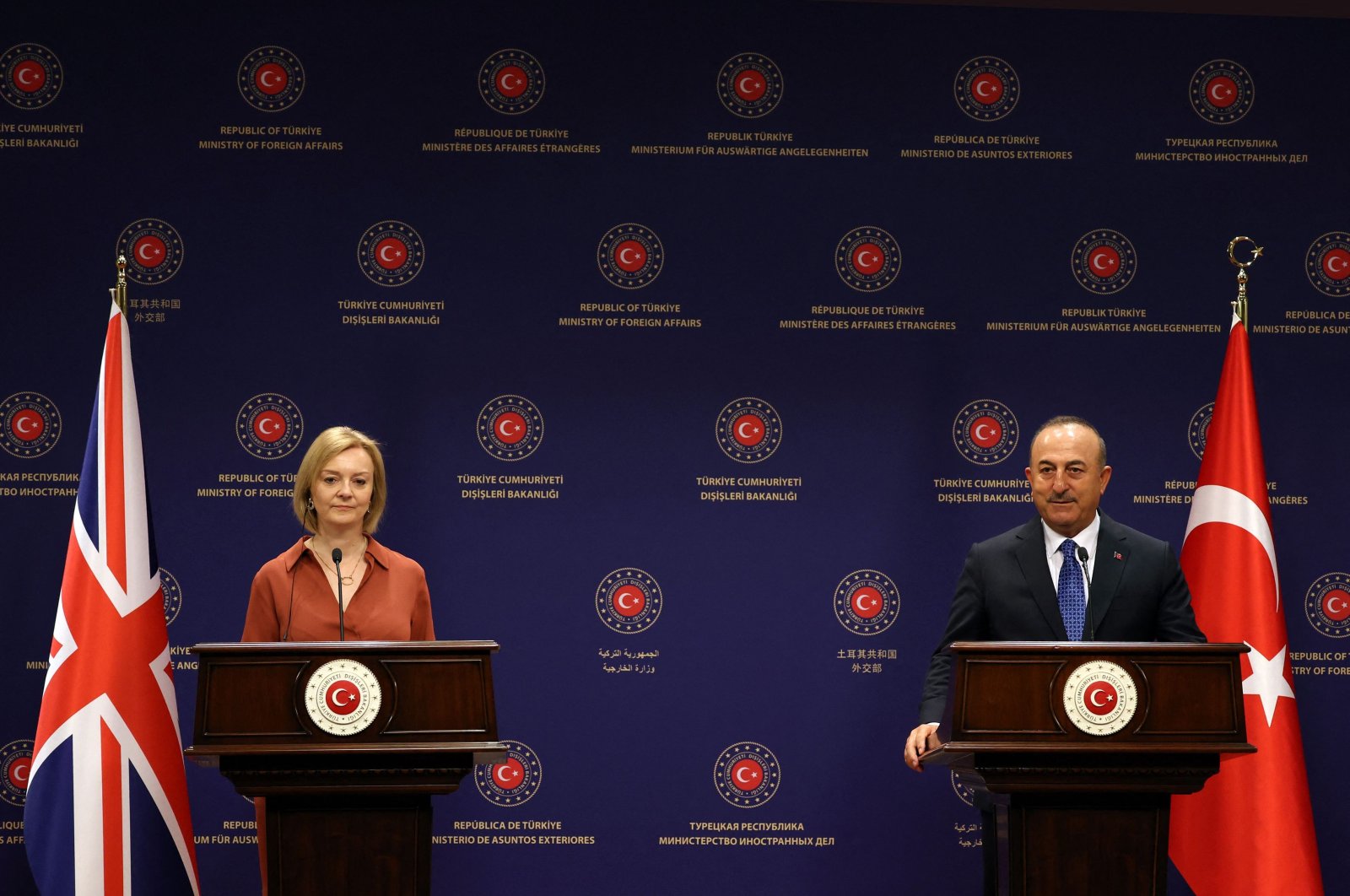Kyiv’s ambassador to Ankara said in early June that Turkish buyers were among those receiving grain that Russia had stolen from Ukraine, adding he had sought Turkey’s help to identify and capture individuals responsible for the alleged shipments.
Russia has previously denied allegations that it has stolen Ukrainian grain.
Foreign Minister Mevlüt Çavuşoğlu appeared to deny Ukraine’s claims of stolen grain shipments arriving in Turkey, saying Ankara had not yet seen any such cases and it had notified Kyiv of every investigation’s outcome.
“We took each claim seriously and carried out investigations based on these claims. We saw that the ships’ port of departure and the origin of the goods is Russia on the records, based on the investigations we made after claims were made about Turkey,” Çavuşoğlu told a joint news conference alongside British Foreign Minister Liz Truss in Ankara.
“We notify especially the Ukrainian side of the result every time.”
Russia and Ukraine account for nearly a third of global wheat supplies, while Russia also heavily exports fertilizer and Ukraine corn and sunflower oil. But Ukrainian grain shipments from its Black Sea ports have stalled since Russia invaded, with some 20 million tons of grain stuck, fueling global food shortages.
Çavuşoğlu said Turkey would oppose Russia or any other country taking Ukrainian grain or other goods and selling them illegitimately to international markets.
“We are against Ukrainian grains or other goods being taken by Russia or any other nation and then illegitimately, illegally being sold to international markets, and we, as Turkey, will not allow these goods to come to us,” he said.
Separately, the Kremlin on Thursday reiterated its assertion that Russia has not stolen any grain from Ukraine.
Asked about Çavuşoğlu’s comments, Kremlin spokesperson Dmitry Peskov said: “You should ask the foreign ministry. Russia has not stolen any grain.”
The United Nations has appealed to both Russia and Ukraine, as well as maritime neighbor Turkey, to agree to a sea corridor for grains to be exported from the Black Sea. Ankara, which has backed the U.N.-led plan, has held talks with Moscow and the U.N. but says all sides need to meet for a final agreement.
‘Devastating consequences’
For her part, Truss said the U.K. and Turkey were working closely together to get the trapped grain out of Ukraine, also offering Britain’s expertise to help resolve the situation.
Hailing Turkey’s “leading role” in opening a grain export corridor from Ukraine, she stressed the urgency of the crisis, adding that it will have devastating consequences if not solved within the next month.
“We are very clear that this grain crisis is urgent, that it needs to be solved within the next month otherwise we could see devastating consequences,” Truss said.
“It’s very clear that Ukrainian ports must be protected, there needs to be safe passage for commercial vessels. The United Kingdom is offering our expertise on all of those fronts to make sure that we have measures in place so that grain can safely leave, but it is going to require an international effort.”
Truss accused Russia of “weaponizing hunger” and using food security as a “callous tool of war.”
Moscow denies responsibility for the food crisis and blames Western sanctions for shortages.
Çavuşoğlu also stressed the issue needs to be resolved “as soon as possible,” adding that Ankara backs the U.N. plan that he said stipulates creating a control center in Istanbul to monitor the passage of vessels in and out of a “safe zone” outside Ukrainian waters.
He was still cautious about a quick solution, saying that some security-related hurdles remain in the way.
Ankara and Moscow have agreed to pursue talks on a potential corridor in the Black Sea to export grain from Ukraine, the Russian and Turkish defense ministries said on Wednesday.
Their statement came after talks between the Turkish and Russian military delegations on Tuesday to discuss the corridor, the safe departure of vessels at Ukrainian ports and the return of Turkish planes at Ukraine’s Borispol airport.
Turkey said the talks were lengthy, “positive and constructive.”
Hours after the meeting, a Turkish dry cargo vessel, the Azov Concord, had safely left Mariupol, the first foreign ship to leave the port since Russia invaded Ukraine on Feb. 24.
While Moscow wants certain Western sanctions lifted to help facilitate grain and fertilizer exports, Kyiv seeks security guarantees for its ports to agree to the U.N.-led plan. Ukraine has also said no agreement can be reached without its approval.
NATO member Turkey has held direct talks with Moscow and the U.N. on the plan but said more was needed for a deal. It said the demands set out by Russia and Ukraine were reasonable.
Çavuşoğlu said on Thursday that Ankara was more focused on talks with Moscow at the moment to arrange a four-way meeting in Istanbul to discuss details of the plan.
Ankara has offered to host an “observation mechanism” to be formed to monitor the implementation of the sea corridor plan in Istanbul.
 m
m